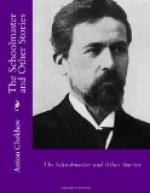“Prisoner,” said the president, addressing Harlamov, “cannot you explain to the court where you were during the three days following the murder?”
“I was wandering about the fields. . . . Neither eating nor drinking . . . .”
“Why did you hide yourself, if it was not you that committed the murder?
“I was frightened. . . . I was afraid I might be judged guilty. . . .”
“Aha! . . . Good, sit down!”
The last to be examined was the district doctor who had made a post-mortem on the old woman. He told the court all that he remembered of his report at the post-mortem and all that he had succeeded in thinking of on his way to the court that morning. The president screwed up his eyes at his new glossy black suit, at his foppish cravat, at his moving lips; he listened and in his mind the languid thought seemed to spring up of itself:
“Everyone wears a short jacket nowadays, why has he had his made long? Why long and not short?”
The circumspect creak of boots was audible behind the president’s back. It was the assistant prosecutor going up to the table to take some papers.
“Mihail Vladimirovitch,” said the assistant prosecutor, bending down to the president’s ear, “amazingly slovenly the way that Koreisky conducted the investigation. The prisoner’s brother was not examined, the village elder was not examined, there’s no making anything out of his description of the hut. . . .”
“It can’t be helped, it can’t be helped,” said the president, sinking back in his chair. “He’s a wreck . . . dropping to bits!”
“By the way,” whispered the assistant prosecutor, “look at the audience, in the front row, the third from the right . . . a face like an actor’s . . . that’s the local Croesus. He has a fortune of something like fifty thousand.”
“Really? You wouldn’t guess it from his appearance. . . . Well, dear boy, shouldn’t we have a break?”
“We will finish the case for the prosecution, and then. . . .”
“As you think best. . . . Well?” the president raised his eyes to the doctor. “So you consider that death was instantaneous?”
“Yes, in consequence of the extent of the injury to the brain substance. . . .”
When the doctor had finished, the president gazed into the space between the prosecutor and the counsel for the defence and suggested:




